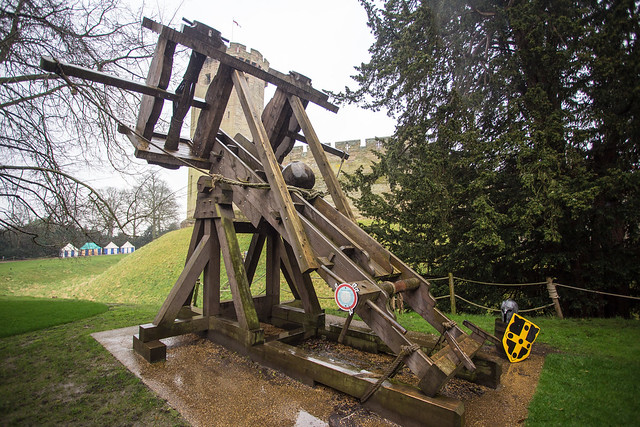When is a gun not a gun?
The word gun nowadays refers to “A device for projecting a hard object very forcefully; a firearm or cannon, etc”. However, originally it wasn’t just used for firearms. The word possibly comes from the name of a ballista, a type of giant crossbow (see above), that was used at Windsor Castle in England in the 14th century – Domina Gunilda (Lady Gunilda).
An inventory of the munitions of Windsor Castle conducted in 1330-31 included the entry:
Una magna balista de cornu quæ vocatur Domina Gunilda.
(A great ballista of horn which is called Lady Gunilda.)
Not long after that, the word gonne starts to appear. It was also written gon, gonn, goone or gun, and referred to:
- A trebuchet or similar kind of pellet-firing siege engine.
- A cannon or other large firearm; a piece of artillery.
- A portable handheld firearm; a gun (i.e. a hand cannon).
- A projectile (rare).
Later, it began to be used specifically for firearms.
The name Gunilda comes from the Old Norse name Gunnhildr, from gunnr (war) and hildr (battle). It’s a female name that’s poetically translated as “battle maid”. Other versions include Gunhilda, Gun(n)hild, Gunill(a), Gunnel, Hildur, Hilda and Hildegard.
Here’s a little song from Hildegard von Blingin’, because why not?
Other names from the same roots include Brunhild(a), Imelda and Matilda.
Sources: https://en.wiktionary.org/wiki/gun#English
https://en.wiktionary.org/wiki/gunne#Middle_English
https://www.wordorigins.org/big-list-entries/gun
https://en.wiktionary.org/wiki/Reconstruction:Proto-Germanic/hildiz
